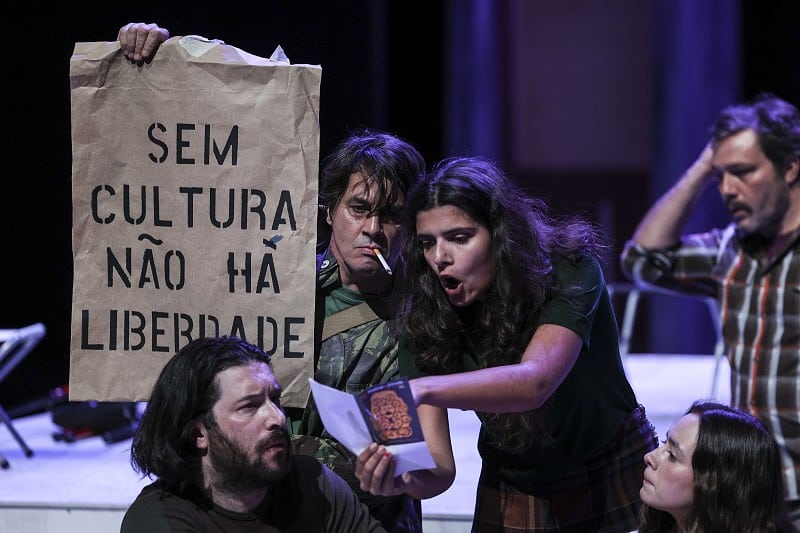The luck of the generations born after April 25, 1974 is the title of the new creation by the Almada Theatre Company (CTA), “A sorte que tivemos!” (The luck we had!), which will be premiered on Friday in the city.
António Cabrita (1959), Rui Cardoso Martins (1967), Patrícia Portela and Jacinto Lucas Pires, both born in 1974, are the authors of the unpublished texts commissioned by the CTA for the show about April 25, marking the 50th anniversary of the Revolution, which is being celebrated this year.
The first thought that occurred to director Teresa Gafeira when she found out she was going to direct the play was to show that “before April 25 [Portugal] was a state of sadness”, and with April 25 it became “a state of joy”, she told the press at the end of a rehearsal for the play.
Without having given any indications to the authors, whose dramaturgy was prepared by the director and actor Cláudio da Silva, who was born in 1974, Teresa Gafeira admitted that, for someone like her “who lived through before, April 25 and after” and is still “alive”, this is “the best way to show something” about what that date brought. Not least because April 25 was also made “so that each person can say what they want and how they want”, she stressed.
The time frame of “A sorte que tivemos!” goes from the Estado Novo to the present day. Images of Salazar, Cardinal Cerejeira, Marcelo Caetano, the embarkation of soldiers for the colonial war on ships that set sail from the Rocha do Conde de Óbidos pier in Lisbon, not forgetting the waving of white handkerchiefs by mothers and wives watching their sons and husbands leave, also mark the show in the short films shown throughout the action.
Scenes of processions, the landing of troops in the then overseas provinces and images of clashes or the dead and wounded of the Colonial War are also shown in images, while the actors take on roles that permeate the temporal action: from the PIDE informer, to the father who saw his son off to war in Guinea, to the rebellious young woman whom her father sent to study at a nunnery.
A piano, a desk, a computer, some rectangles and a small floor at a higher level complete the scenography designed by Sérgio Loureiro, who also did the costumes.
On the eve of the premiere, Teresa Gafeira says she would like the audience to leave the play “with the idea of what’s in the title”. “That they think how lucky we were to be born after April 25.”
Admitting the limitations of theater for the documentary part, in what she considers the work of “historians and sociologists”, for which theater has limits, Teresa Gafeira said: “I’m old and there are still people my age who lived through it and know what happened before and after [the coup that ousted the dictatorship].
Teresa Gafeira also said that she expected most of the play’s audience “not to be 70-year-olds”, but “younger people”. “People who don’t know anything about what was going on, nor do they have the slightest notion of what the ‘Carnation Revolution’ was” “or what it enabled us to achieve”, she stressed.
She gave the example of the violence of a song that was compulsory in elementary school before April 25, which is also sung in the show, “which she never forgot and which marked her for life”.
“At school I was told about our history/ The struggles, the journeys of the past/ No longer wiped from my memory/ They told me and I was amazed/ (…)O my land, I’m nobody/ But if there’s a war, I want to go too/ To die for you there in that loyal homeland/ Which I’ve never seen, but which is also Portugal/ We’re small/ But we have faith/ We’re also going to die on our feet […]”, sang the director, quoting the verses that “never left” her mind.
“This little song is extraordinarily significant of the repression,” he said.
“People didn’t talk, they were afraid,” he said. They knew, but they couldn’t say “that there were I don’t know how many political prisoners. […] It was all like that”. Today, it doesn’t even “cross their minds” what it was like.
Without talking about heroes, whether “political or military”, “A sorte que tivemos!” puts on stage “what existed before April 25, such as the PIDE, repression and the malaise experienced by people”, he observed.
She didn’t rule out the fact that nowadays there is also some self-censorship, as she said, which “pays off from an economic point of view”: however, these days, “I can miss an opportunity, I can live badly, live a little worse, but I’m not going to jail. And that makes all the difference,” she emphasized.
That’s why he stresses that the younger generations need to know “how lucky they were to be born after April 25”.
“And freedom was won thanks to April 25 and not to God!” he concluded.
With original music by Martim Sousa Tavares, the play is on stage until May 5th, with performances from Thursday to Saturday at 21:00 and on Wednesdays and Sundays at 16:00.
Performing are Carolina Dominguez, Cláudio da Silva, David Pereira Bastos, Duarte Grilo, Flávia Gusmão, Joana Bárcia, João Farraia, João Maionde and Pedro Walter, and Escola Superior de Teatro e Cinema (ESTC) interns Íris Cañamero and Matilde Santos.
The light design is by Guilherme Frazão, the video by José Pires and the movement by Cláudia Nóvoa.
Ana Isabel Santos is on the piano, André Marques on the saxophone, Pedro Pereira on the sousaphone, Hélder Silva on percussion and Ana Valente assisting with the staging.
On the day of the play’s premiere, the exhibition “The explosion of freedom through the eyes of the theater” opens, an initiative of the CTA in partnership with the Ephemera Archive, with documentation by José Pacheco Pereira and Rita Maltez and visual design by José Manuel Castanheira.
As part of the Ephemera Archive exhibitions held in partnership with the CTA, talks will also be held with the public on the theme “The days of the revolution”.
On Saturday 13th, historian and commissioner of the 50 Years of April 25 Commemorative Commission, Maria Inácia Rezola, will speak about “50 years of freedom”, in a conversation moderated by Rita Maltez.
On the 20th, journalist Adelino Gomes, who reported on the day of the Revolution, will be there to tell “Estive, vi, conti” (I was, I saw, I told), moderated by Raul Pinto.
A week later it will be Guilherme Filipe and Pedro Cerejo’s turn to talk about “Censorship of the theater”, moderated by Nuno Nabais.
“The MFA’s cultural dynamization campaigns”, on May 4, with Manuel Begonha and Sónia de Almeida, moderated by Pedro Maia, and “Luiz Pacheco e tal: editar em ditadura”, on May 11, with José Pacheco Pereira and Pablo Fidalgo, moderated by Anderson Fonseca, complete the series of talks.









